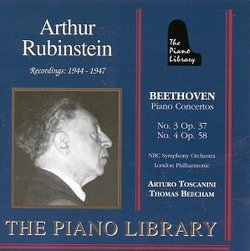| All Artists: Rubinstein, Beecham Title: Plays Beethoven Members Wishing: 0 Total Copies: 0 Label: Enterprise Release Date: 8/25/1998 Genre: Classical Styles: Forms & Genres, Concertos, Historical Periods, Classical (c.1770-1830), Modern, 20th, & 21st Century, Instruments, Keyboard, Symphonies Number of Discs: 1 SwapaCD Credits: 1 UPC: 723723357229 |
Search - Rubinstein, Beecham :: Plays Beethoven
 | Rubinstein, Beecham Plays Beethoven Genre: Classical
|
Larger Image |
CD Details |
CD ReviewsGreat & Intense Readings from the 1940s of Beethoven Cti 09/15/1998 (3 out of 5 stars) "The Third Concerto is taken from the live NBC network broadcast of Oct. 29, 1944, with Toscanini and his orchestra accompanying Rubinstein. The original 78 rpm issue had severe constant flutter, affecting the pitch, and was never well regarded by critics. There was a brief ly available (very poor sounding) LP issue during the fifties...then everyone seems to have forgotten about the recording. During the first series of RCA compact disk recordings of Toscanini, it was revived in the early 80s from a different set of acetate aircheck disks that did not have the pitch problems of the 78 masters, and issued with the Heifetz/Toscanini commercial recording of the Beethoven Violin Concerto; then in the 90s it was reissued in the RCA/BMG "Toscanini Collection" in similar crystal clear sound (but slightly affected by surface noise from the original acetate disks.) In this Piano Library transfer, Cedar processing has removed ALL traces of noise, but sadly has also completely eliminated any sense of realistic audio ambience: the dramatic pauses in the score are followed by silences that are so total and deeply "black" that the effect is like turning off the sound altogether. No other recording of the piece has this artifact, and the authorized original RCA CD transfer is much more realistic. But if you are appalled at hearing ANY kind of click, pop, or hiss, then this new transfer might be preferred. The interpretation is quite interesting: tempo rubato is used rather freely in places, and Rubinstein plays with more aggressive forcefulness than in his later commercial recordings. Toscanini's conception of the accompaniment seems to have undergone a major change in perspective for his broadcast 2 years later with Myra Hess; in this earlier reading, there are a few tentative spots where one senses the Maesto searching for a point of view. Nonetheless, it is a bracing if not conventional rendition!The Fourth Concerto was done under studio sessions with the elegance of a well worked out Beecham accompaniment, in fine EMI late-forties sound. The earlier World Record Club LP issue of the seventies had richer and more brilliant sound, but this particular CD transfer is acceptable (and better than the Third Concerto in its resemblance to the original disks.) Saint-Saens' cadenzas are employed (a rare experience) and the interpretation seems more focused and polished than the Toscanini broadcast of the c-minor concerto. This is NOT a Germanic view of the piece (such as Kempff or Backhaus have given us): it emphasizes the pensive, romantic qualities and sounds at times almost Schumannesque. For over two decades I have lived with this reading, and continue to appreciate it."
|

 Track Listings (6) - Disc #1
Track Listings (6) - Disc #1